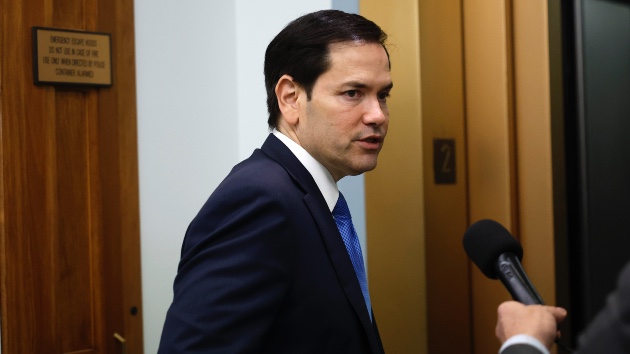Fishermen’s Supreme Court fight against government monitors could make big splash
Written by ABC Audio ALL RIGHTS RESERVED on September 27, 2023
(CAPE MAY, N.J.) — For nearly 50 years, America’s herring fishermen have been required to take federal monitors on their boats when they set out into the North Atlantic.
Aboard cramped private trawlers, the monitors record the health of fish and of the sea.
But now there’s a catch.
When regulators said the fishermen were on the hook to pay the monitors’ salaries, many said the government had gone too far.
“We don’t mind taking observers, you know, we have for decades now,” said Stefan Axelsson, a third-generation herring fisherman. “But to be told to pay for it just isn’t right.”
“Me and everybody around me is concerned about that, highly concerned,” added Bill Bright, who has been in the herring business for four decades, “because the margins are so tight right now.”
This fall, Axelsson, Bright and half a dozen other fishermen — who say the added expense could drive some out of business — will take their crusade against the policy to the U.S. Supreme Court.
A ruling in their favor could have an impact far beyond the ocean, experts say.
“This case is going to completely change the way the federal government operates if the Supreme Court decides to change the status quo,” said Meredith Moore, director of the fish conservation program at Ocean Conservancy and member of the nation’s Marine Fisheries Advisory Committee. She says this is a “Trojan horse” for the anti-regulation movement — a loophole that could affect oversight across the federal government.
At issue in the case, Loper Bright Enterprises v. Raimondo, is how much discretion federal agencies should have in doing their jobs — setting rules that govern everything from public health to environmental protection to tax collection – when Congress does not spell out the details in the laws that authorize regulation of American life.
The fishermen say a 1976 law directing management of the nation’s fisheries — the Magnuson-Stevens Act — says nothing about requiring them to foot the bill for their own minders.
“You expect the government to pay the police force. You expect the government to pay for the IRS auditors. So that seems like kind of the default assumption. If Congress thinks this is really important that there be a monitor on every ship, then it can pay for a monitor on every ship,” said Paul Clement, one of the country’s most experienced Supreme Court lawyers who has argued over 100 cases.
Lawmakers have not appropriated funding for a federal monitoring corps aboard all vessels.
Clement says the fishermen’s dispute with the National Marine Fisheries Service is just one example of how agencies, like the National Oceanic and Atmospheric Administration, Environmental Protection Agency and the Internal Revenue Service, have seized too much power that Congress never intended them to have in some cases.
“This is about gray areas, but the problem is, once you say that there are gray areas and then there’s a different rule, people start seeing gray everywhere,” Clement said. “If the agency really wants this authority, they should go back to Congress and get it.”
Since 1984, the Supreme Court has said judges should generally defer to federal agency experts in disputes over ambiguities in the law. The practice has become widely known as the Chevron Doctrine, named after the case Chevron U.S.A. Inc. v. National Defense Resources Council.
A federal appeals court sided with the government in the fishermen’s challenge.
“If you got rid of Chevron you would essentially force – you’d make the executive branch a little less powerful. You’d make the other two branches a little more powerful,” Clement says.
For years, the executive branch – under presidents of both political parties – has vigorously defended the legal precedent and the leeway it provides. But several conservative members of the high court have signaled an eagerness to overturn Chevron.
“We don’t want Congress trying to figure out the nitty gritty details of literally everything,” said Moore. “Congress has delegated these sorts of authorities to federal agencies to be experts, to be scientists, to be these technicians and make sure that we’re protecting human health and safety and the environment.”
The NOAA declined comment to ABC News about the case, citing the pending litigation.
The Biden administration argues in court documents that Congress explicitly gave fisheries regulators the power to set rules “as may be necessary” to do their jobs. The broad language implicitly gives the agency authority to have fishermen pay their observers, it argues.
“What we could lose with this case is the grounding of our government in expertise and science in the way that we interpret laws all over the country,” said Moore.
Meanwhile, Axelsson and Bright say the salary payment rule — which has not yet taken effect — could make the economics of fishing herring significantly more difficult.
Higher insurance rates and fuel costs have eaten into profit margins over the past decade, and shrinking stocks of fish, likely caused by climate change, have meant dramatically lower government caps on what they can catch.
“Nobody has more invested than me and Steve, and nobody cares more about this fishery and nobody cares more about the ocean than we do,” Bright said. “There is without a doubt a role [for] the government [in managing the fishery], but this should be based on, in our opinion, in science.”
Since 1976, federal marine observers have been put on commercial fishing vessels to collect data to help set fishing guidelines. The scientists track water temperature and condition of the fish, and monitor for protected species swept up in the nets. They do not have law enforcement authority.
For sometimes days at sea, they’re In close quarters with the fishermen, even sharing bunk beds in a tiny cabin.
In 2020, federal regulators — looking to expand coverage of observers at sea — moved to require some herring fishermen to directly pay observer salaries — up to $700 a day. By one estimate, that could top 20% of the revenue from a fisherman’s catch.
“Sometimes [the catch is] zero. Sometimes we have to go back out next trip to cover what the expenses were from this trip,” said Axelsson. “So at some point, I may not make a herring trip if I got to, you know, take a monitor and pay for it because it might not be worth it to me and my crew.”
As Bright prepares for herring season in November and Axelsson games out his next big catch, both men say their minds will be on the Supreme Court — just don’t expect to see them in the courtroom for oral arguments.
“I’ll probably be fishing,” Axelsson said. “Probably be fishing, too,” added Bright.
Copyright © 2023, ABC Audio. All rights reserved.







